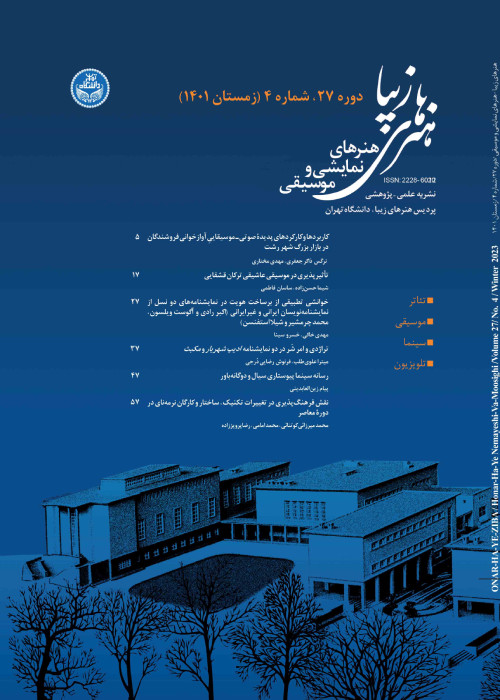Study of concept of time in Wong kar-wai٬s cinema base on the Gilles Deleuze٬s theories
Author(s):
Article Type:
Research/Original Article (دارای رتبه معتبر)
Abstract:
Wong Kar-Wai is a filmmaker who has always been known for his unique visual style and his attention to fragmented narratives and non-linear editing that has attracted film audiences and critics, and even the academic community. While critics have noted his style for using unusual camera angles, saturated colors, and non-linear editing, what is apparent in most of his films is his obsession with time and memory themes. In addition, contemplation is a subject that can be described as a kind of melancholy, depression, or nostalgia that is not unrelated to the category of time. Henry Bergson and Gilles Deleuze have been thinkers who have always been concerned with time and memory. Although Bergson did not favor cinema, his concern for understanding how time was perceived led him to create concepts that were the basis of Deleuze’s work. Deleuze’s two key concepts in his theory were: movement-image and time-image. We are led to distinguish between classical linear time and the concept of time in modern times. As stated above, the main purpose of this study is to provide a comprehensive study of the entire workbook of Wong Kar-Wai in order to show how his films are interconnected and intertwined with the aforementioned concepts and also to show the many differences and unique identity of the works. In our view, what provides this unity is how Kar-Wai deals with the issues of movement and time that are present in all of his films. In fact, we want to explore what technical, narrative, and time-consuming features of filmmaking allow to integrate them all. To this end, our hypothesis is that his cinema is capable of being examined by Gilles Deleuze’s comprehensive categorization of cinematic cues, namely movement-image and time-image. Deleuze’s theory seems to resonate at every level of Wong Kar-wai’s films: from the dual nature of representation to the understanding of time and memory. Although many haveMosayeb Sharafi**1, Ali Rouhani21 Graduate Master in Cinema, Faculty of Cinema and Theater, Tehran University of Art, Tehran, Iran.2Associate Professor, Faculty of Cinema and Theater, Tehran University of Art, Tehran, Iran.(Received 7 July 2020, Accepted 5 Mar 2021)referred to the Deleuze-Kar-Wai relationship, no attempt has been made to systematically describe the relationship. Of course, we’re not just adding Deleuze categories to Wong Kar-Wai’s films, but we want to use its classification of cinematic symbols and images to explore his cinema. Simultaneously, we focus more on the category of time-image and the related concept of what Deleuze calls the crystal-time. In relation to time-image duality, we examine ways of creating pure visual and acoustic states that, according to Deleuze, are the preliminary and primary features for the emergence of time-pure images or time crystals. When Deleuze conveys the concept of the crystal-time, it is neither a psychological time unique to an individual mentality, nor even a humanistic time associated with existentialist attitudes, but rather a kind of ontological time related to Bergson’s category of duration. The general method of this research is descriptive and with some qualitative research using case studies and taking into consideration Gilles Deleuze’s theoretical framework of cinema thinking and using library resources and case studies of films and study the works. During the review we also use Henry Bergson’s theories related to the subject.
Keywords:
Language:
Persian
Published:
Honar-Ha-Ye-Ziba: Honar-Ha-Ye Mosighi Va Namayeshi, Volume:26 Issue: 69, 2021
Pages:
59 to 68
magiran.com/p2287338
دانلود و مطالعه متن این مقاله با یکی از روشهای زیر امکان پذیر است:
اشتراک شخصی
با عضویت و پرداخت آنلاین حق اشتراک یکساله به مبلغ 1,390,000ريال میتوانید 70 عنوان مطلب دانلود کنید!
اشتراک سازمانی
به کتابخانه دانشگاه یا محل کار خود پیشنهاد کنید تا اشتراک سازمانی این پایگاه را برای دسترسی نامحدود همه کاربران به متن مطالب تهیه نمایند!
توجه!
- حق عضویت دریافتی صرف حمایت از نشریات عضو و نگهداری، تکمیل و توسعه مگیران میشود.
- پرداخت حق اشتراک و دانلود مقالات اجازه بازنشر آن در سایر رسانههای چاپی و دیجیتال را به کاربر نمیدهد.
In order to view content subscription is required
Personal subscription
Subscribe magiran.com for 70 € euros via PayPal and download 70 articles during a year.
Organization subscription
Please contact us to subscribe your university or library for unlimited access!



